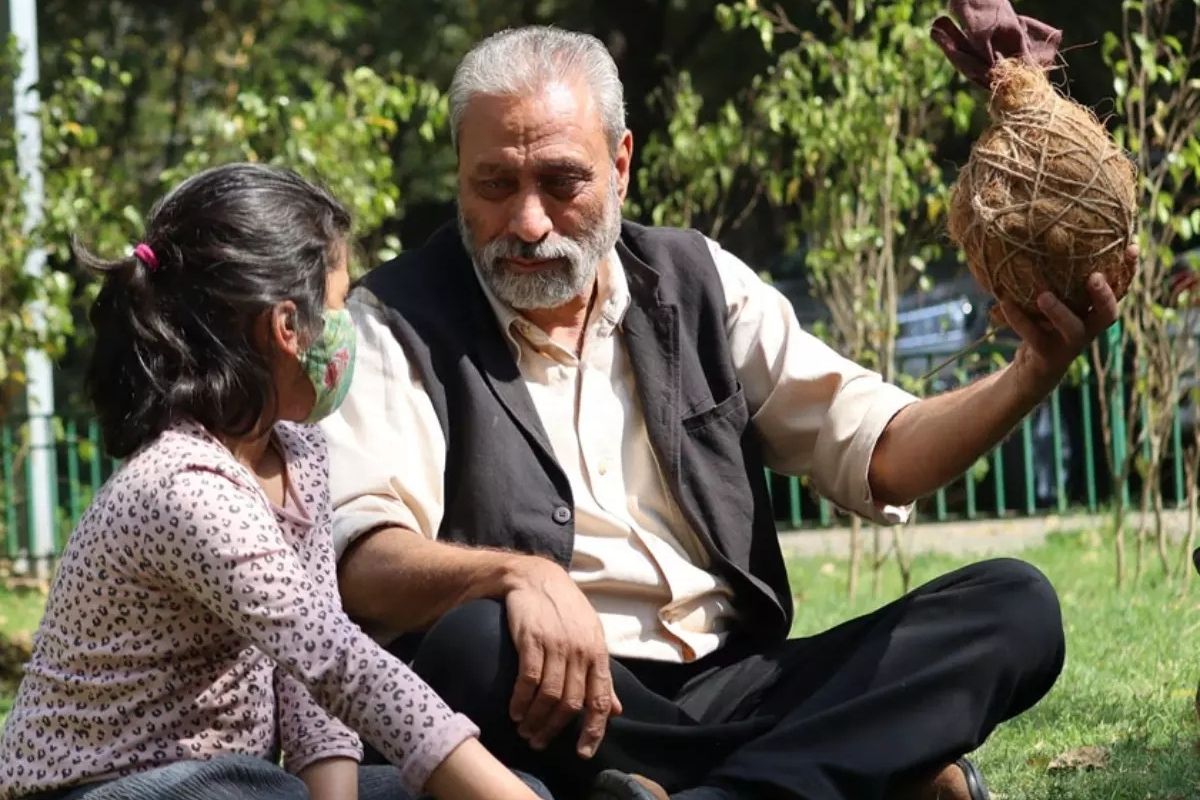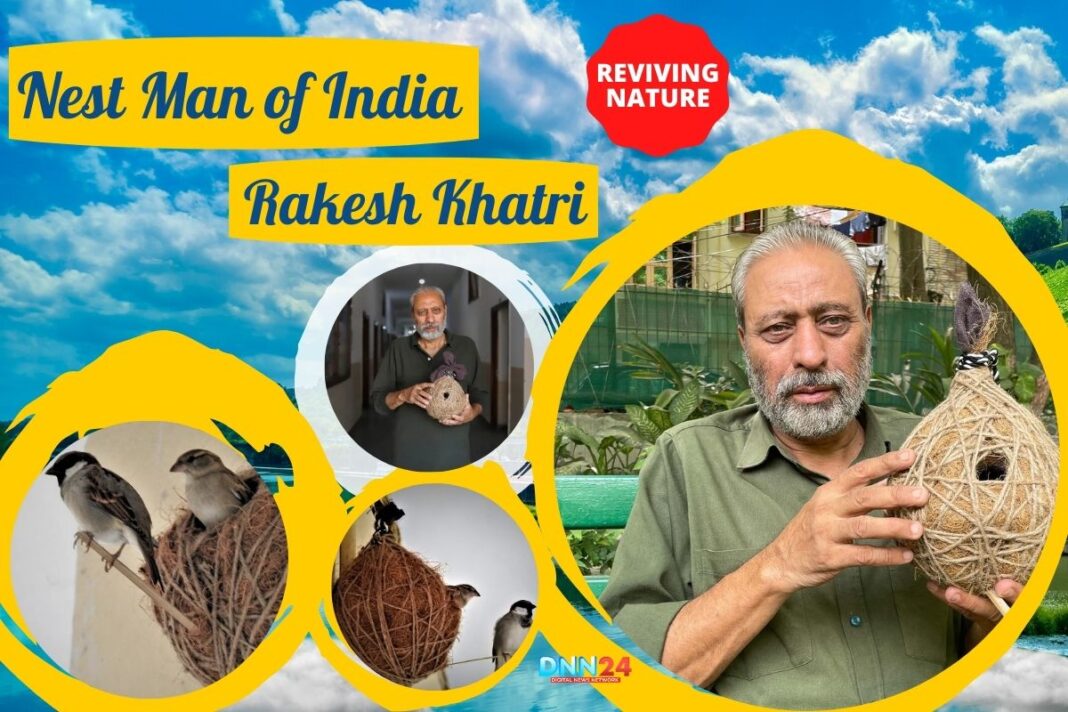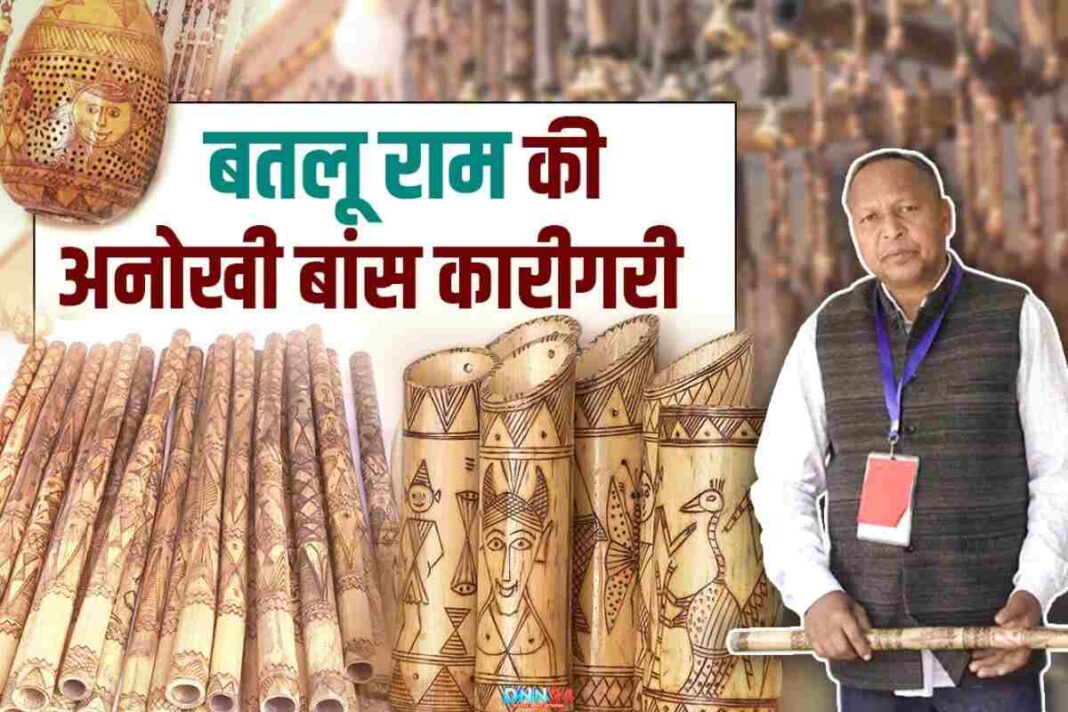In the heart of urban India, where the cacophony of city life often drowns out the gentle chirping of birds, one man stands as a beacon of hope for our feathered friends. Rakesh Khatri fondly called the “Nest Man of India,” has dedicated his life to a mission that is as simple as it is profound: building homes for birds in a world rapidly running out of space for them. His journey from the bustling lanes of Old Delhi to becoming a national symbol of conservation is nothing short of inspiring.
Through his innovative use of eco-friendly materials and his relentless drive to involve communities, Khatri has revived the dwindling sparrow population and rekindled a sense of environmental responsibility among lakhs of Indians. His story is a reminder that even in a concrete jungle, there is room for compassion, creativity, and coexistence with nature. As we delve into the life and work of Rakesh Khatri, we discover how one man’s passion can spark a nationwide movement and how his NGOs are shaping a greener, more harmonious future for both people and birds.
Rakesh Khatri’s Early Life: Seeds of Compassion in Old Delhi
Rakesh Khatri’s love for birds was born in the crowded bylanes of Old Delhi, where the sight of sparrows flitting from one rooftop to another was a common delight. Growing up in a modest household, Khatri faced his share of hardships, especially after the untimely demise of his father when he was just 14. Forced to take up a job in a perfume factory to support his family, young Rakesh found solace in the company of birds. His resilience, ability to find joy in the smallest of spaces, and tireless efforts to build nests fascinated him.

As Delhi’s skyline changed and old buildings gave way to glass-and-steel structures, Khatri noticed a disturbing trend: sparrows and other small birds were disappearing. The nooks and crannies that once served as their nesting sites were vanishing. This loss struck a deep chord in his heart. He realised that, while inevitable, urbanisation was coming at a cost to the creatures that shared our environment. This realisation sowed the seeds of his lifelong mission: to restore the balance between urban development and nature, starting with the humble act of building nests for birds.
Rakesh Khatri’s First Nest: Triumphs and Trials
In 2007, driven by a sense of urgency and nostalgia, Rakesh Khatri decided to take matters into his own hands. He attempted to craft his first bird nest using coconut husks, hoping to attract the sparrows back. However, the attempt was disappointing as the birds ignored his creation. Most people would have given up, but not Khatri. Undeterred, he experimented with different materials and designs, learning from each failure. In 2008, he tried using bamboo sticks- a material closer to what birds might choose in the wild. After days of patient waiting, his perseverance was rewarded when a pair of sparrows finally made the nest their home.
This small victory was more than just a personal achievement; it was the spark that ignited a movement. Khatri realised that the key to success lay in understanding the needs of the birds and working with nature, not against it. His journey was not without challenges- he faced scepticism from neighbours, ridicule from friends, and the ever-present struggle of balancing his passion with the demands of daily life. Yet, each nest built, each bird that returned, strengthened his resolve to continue.
Eco Roots Foundation: Nurturing Nature, Empowering People
Recognising that the issue was larger than one man could tackle alone, Rakesh Khatri founded the Eco Roots Foundation. This NGO became the platform through which he could amplify his impact, bringing together like-minded individuals and communities. The Eco Roots Foundation is dedicated to environmental conservation, focusing on bird habitat restoration and sustainability. Under Khatri’s leadership, the Foundation has constructed over 7.88 lakh bird nests across India, using eco-friendly materials like bamboo, jute, and recycled Tetra packs. But the Foundation’s work goes beyond just building nests. It organises workshops in schools, colleges, and communities, teaching people- especially children- the art of nest-making and the importance of coexisting with nature.
The Foundation has reached over 14 lakh individuals, including more than 2 lakh students, spreading awareness and inspiring action. Eco Roots collaborates with government bodies and corporate partners to implement large-scale conservation projects. The Foundation’s holistic approach addresses the immediate need for bird shelters and the broader issues of urban environmental degradation and loss of biodiversity. Eco Roots is nurturing a new generation of eco-warriors equipped with knowledge and empathy through its initiatives.
Jal Sparsh: Empowering Women, Restoring Water Bodies
One of the most innovative projects under the Eco Roots Foundation is Jal Sparsh, supported by the Small Industries Development Bank of India (SIDBI). This initiative tackles the twin challenges of environmental conservation and women’s empowerment. India’s water bodies are plagued by the invasive water hyacinth, which chokes aquatic life and disrupts ecosystems. Jal Sparsh trains rural and tribal women to extract water hyacinths from local ponds and transform their stems into marketable, eco-friendly products. From handbags and meditation mats to fruit baskets and coasters, these products are a testament to the creativity and resilience of the women involved.
The project has directly impacted over 2,000 women across five states and 100 villages, restoring more than 100 water bodies and enhancing local biodiversity. By turning an environmental menace into a source of sustainable livelihood, Jal Sparsh is a shining example of circular economy in action. The products crafted under this initiative are eco-friendly, support rural artisans, and promote community empowerment. Jal Sparsh demonstrates how environmental action can go hand-in-hand with social development, creating positive change that benefits both people and the planet.
Rakesh Khatri’s Workshops and Community Engagement: Spreading the Message
A key pillar of Rakesh Khatri’s mission is education and community engagement. Through the Eco Roots Foundation, he has conducted thousands of workshops across India, teaching people of all ages how to make bird nests using sustainable materials. These workshops are more than just skill-building sessions-they are immersive experiences that reconnect participants with nature. In just 25 minutes, attendees learn not only the technique of nest-making but also the science behind bird behaviour, the importance of biodiversity, and the role of individuals in conservation. Schools, colleges, and even corporate offices have become venues for these workshops, turning conservation into a collective effort.
The impact is visible: areas that once saw a decline in sparrow populations are now witnessing their return, thanks to the proliferation of artificial nests. Khatri’s approach is inclusive-he believes that everyone, regardless of age or background, can contribute to saving birds. He has created a ripple effect by empowering communities with knowledge and practical skills, inspiring thousands to take up the cause. The workshops also foster a sense of ownership and pride among participants, making them active stakeholders in the movement to protect India’s avian heritage.
Overcoming Challenges: Perseverance Against All Odds
Rakesh Khatri’s journey has not been without its share of obstacles. In the early days, he faced widespread scepticism-many believed that birds would never accept human-made nests, while others questioned the need for such efforts. Funding was often challenging, as conservation work rarely attracts the kind of attention or resources that other causes do. Yet, Khatri’s unwavering determination saw him through. He continued to innovate, refining his nest designs and experimenting with new materials. He reached out to experts, collaborated with scientists, and incorporated feedback from the communities he worked with.
Over time, the results spoke for themselves: sparrow populations began to recover, and the workshops gained popularity. Media coverage and recognition from environmental bodies brought much-needed visibility to his work. Khatri’s story is a testament to the power of perseverance and the impact one can have when driven by passion and purpose. His ability to turn setbacks into stepping stones and his refusal to give up in the face of adversity have made him a role model for aspiring conservationists nationwide.
Recognition and Awards: Celebrating a Green Crusader
Rakesh Khatri’s work’s impact has been recognised nationally and internationally. He has been honoured with numerous awards, including the prestigious National Science Award by the Government of India, the Green Leadership Award from the India CSR Network, and the International Green Apple Award from the House of Commons, London. His name is featured in the Limca Book of Records for organising the most significant number of nest-making workshops and building the most nests with the help of students. In 2020, he was named an Earth Day Network Star, further cementing his status as a global environmental champion.
Despite these accolades, Khatri remains grounded and focused on his mission. For him, the greatest reward is seeing the return of sparrows to urban landscapes and witnessing the joy on the faces of children who build their first nest. His legacy is not just in the lakhs of nests he has built, but in the countless lives he has touched and the renewed hope he has brought to India’s urban bird populations. Through his work, Khatri has shown that recognition, while gratifying, is secondary to the satisfaction of making a real difference.
The Legacy Continues: Inspiring Future Generations
Rakesh Khatri’s journey is far from over. With the Eco Roots Foundation and initiatives like Jal Sparsh, he continues to inspire and empower new generations of environmentalists. His work has sparked a nationwide movement, with schools, colleges, and communities across India joining hands to protect birds and restore ecosystems. The Foundation’s model is now replicated in other countries, spreading the message of sustainable living and community-driven conservation.
Khatri’s story is a powerful reminder that change begins with a single step and that even the smallest actions can have far-reaching consequences. As urban India grapples with the challenges of rapid development and environmental degradation, the song of the sparrow sound once feared lost- is making a comeback, thanks to the efforts of the Nest Man of India. His legacy will endure, not just in the nests that dot the cityscapes but in the hearts and minds of those he has inspired to dream of a greener, more harmonious world.
Conclusion: A Song of Hope for India’s Birds
The tale of Rakesh Khatri celebrates resilience, innovation, and the enduring bond between humans and nature. From the narrow lanes of Old Delhi to the corridors of international recognition, his journey is proof that one person’s passion can transform the world. Through the Eco Roots Foundation and initiatives like Jal Sparsh, Khatri has shown that conservation is not just about saving birds-it is about restoring balance, empowering communities, and nurturing hope.
As sparrows chirping once again fill the air in cities across India, we are reminded that every small act of kindness counts. The Nest Man of India has given wings to a movement that will soar for generations, inspiring us all to build a better, more compassionate world nest at a time.
Also Read: Harsh Tiwari’s Solar Mission with EMPBindi International
You can connect with DNN24 on Facebook, Twitter, and Instagram and subscribe to our YouTube channel.



